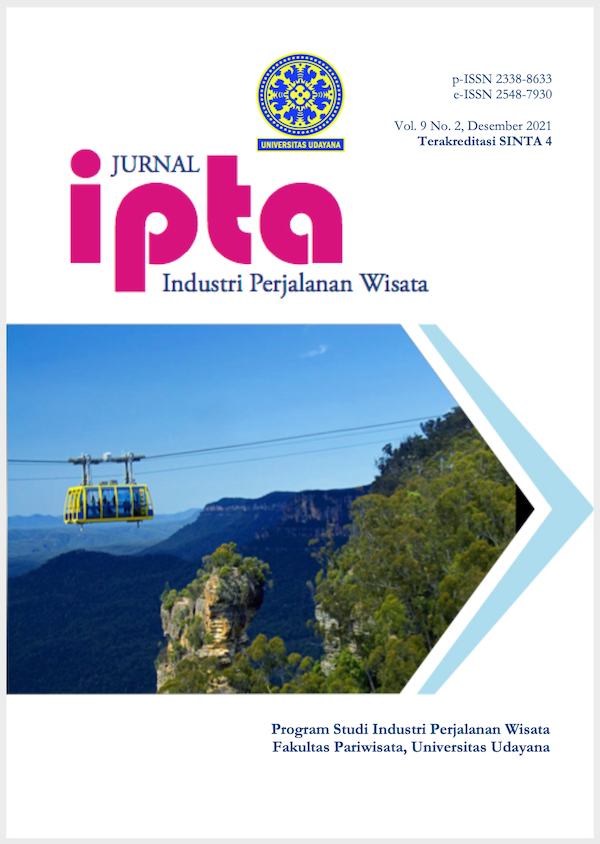MOTIVASI WISATAWAN MILLENNIAL BERKUNJUNG KE DESA WISATA JATILUWIH KABUPATEN TABANAN
Abstract
The millennial generation is a generation that is young and has more courage to travel in the new normal era compared to the generations above and below. Therefore, this study aims to determine the factors that influence the motivation of millennial tourists to visit Jatiluwih Tourism Village. This study uses descriptive quantitative data analysis with the confirmatory factor analysis method. The sampling technique was taken by purposive sampling with a total of 200 respondents from the millennial tourists who visited the Jatiluwih Tourism Village, Tabanan Regency. The data collection using observation, questionnaires, and interviews. The data analysis technique used factor analysis which was assisted by using SPSS Version 26 for Windows. Five push factors influence the motivation of millennial tourists to visit Jatiluwih Tourism Village, Tabanan Regency, namely: the desire to escape from routines, hobbies, enchant kinship and relationship, adventure, and prestige and four pull factors that influence the motivation of millennial tourists to visit Jatiluwih Tourism Village, Tabanan Regency, namely: natural places, sanitation facilities, cleanliness, and tourist attractions. The factor of desire escape from routine becomes the dominant factor in encouraging millennial tourist to visit the Jatiluwih Tourism Village, Tabanan Regency with an eigenvalue of 4,734 and percentage variance equal to (26.301%), while the factors natural places become the dominant factor in attracting millennial tourist to visit the Jatiluwih Tourism Village, Tabanan Regency, with an eigenvalue value of 7.478 and percentage of variance (33.989%).
Downloads
References
Anonim. (2020). Surat Edaran (SE) Nomor 556/1028/DISPAR tentang “Pembatasan Kegiatan Keramaian Terkait COVID-19”. Tabanan: Pemerintah Kabupaten Tabanan.
Angriyana, S. (2019). Milenial Adalah Generasi Pendorong Perubahan Tren Pariwisata. Dipetik 1 Juli, 2020, dari https://travel.detik.com/travel-news/d-4528793/milenial-adalah-generasi-pendorong-perubahan-tren-pariwisata
Boston Consulting Group (BCG) bersama University of Berkley. (2011). American Millennials: Deciphering the Enigma Generation. 2011.
DTW Jatiluwih Siap Hadapi New Normal. (2020). Dipetik 3 Juli, 2020, dari https://www.nusabali.com/berita/75626/dtw-jatiluwih-siap-hadapi-new-normal
Parhusip, N. E., & Arida, I. S. (2018). Wisatawan Milenial di Bali (Karakteristik, Motivasi dan Makna Berwisata). Jurnal Destinasi Pariwisata, 6, 2.
Pitana, I., & Gayatri, P. G. (2005). Sosiologi Pariwisata. Yogyakarta: Penerbit Andi.
Rai Utama, I. B. (2011). Agrowisata Sebagai Pariwisata Alternatif. Universitas Dhyana Pura, 1.
Ramadhan, N. (2020). Travel Kompas. Dipetik 30 Agustus, 2020, dari https://travel.kompas.com/read/2020/07/31/220800527/hasil-survei-milenial-berani-ambil-risiko-berlibur-di-tengahpandemi?page=all
Salsabila, Y. (2019). Karakteristik Wisatawan Milenial dalam Meningkatkan Daya Saing Produk Wisata di Orchid Forest Bandung. Bandung: Sekolah Tinggi Pariwisata Bandung.
Strauss, W., & Howe, N. (2009). Millennials Rising: The Next Great Generation. New York: Vintage Book.
Sutrisno, E. (2013). Manajemen Sumber Daya Manusia. Jakarta: Kencana.
Tripadvisor. (2019). Dipetik 13 April, 2020, dari https://www.tripadvisor.com/
Uysal, M., Mang, F., & Tepanon, Y. (2008). Measuring tourist satisfaction by attribute and motivation: The case of a nature-based resort. Journal of Vacation Marketing, 14(1), 41-56.
Woodside, A. G., & Martin, D. (2008). Tourism Management: Analysis, Behaviour and Strategy. London: CAB International.
Yoon, Y., & Uysal, M. (2005). An Examination of The Effect of Motivation and Satisfaction on Destination Loyalty : a Structural Model. Tourism Management, 26, 45-56.
Zeng, G. (2015). Tourism and Hospitality Development Between China and EU. Guangzhou: Springer.

This work is licensed under a Creative Commons Attribution-ShareAlike 4.0 International License.





